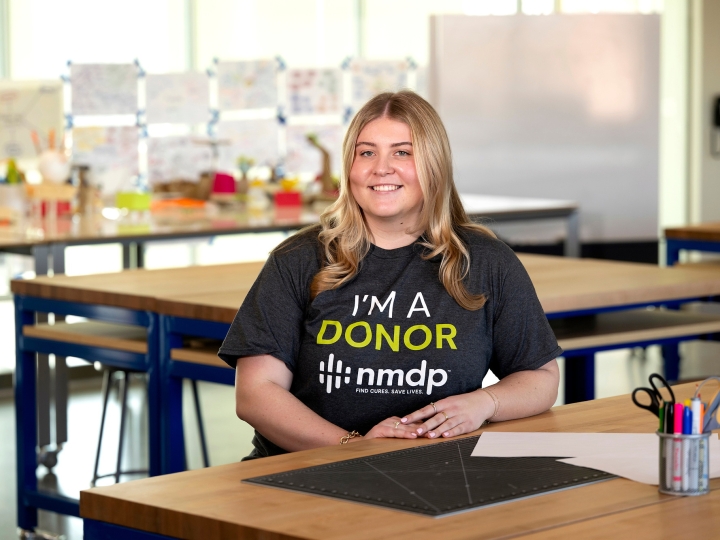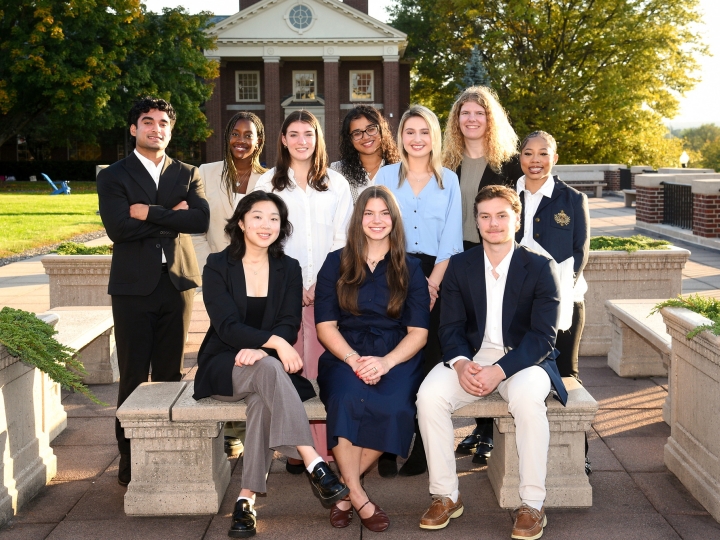Fareed Zakaria Offers Defense of Free Speech and the Liberal Arts at Bucknell’s 167th Commencement
May 21, 2017
As the graduates of Bucknell University's Class of 2017 stepped across the stage on the Malesardi Quadrangle to receive their degrees on Sunday, May 21, each passed by a banner the class designed together four years earlier. Above and below an image of the Christy Mathewson-Memorial Gateway, the banner proclaimed a motto, inscribed in Latin and English: "The power to transform the future lies within our differences."
From the ceremony's opening invocation to the Commencement address delivered by journalist FareedZakaria to student speaker Max Ferrer's closing words to his peers, the banner's message echoed. Its words signified not only a defining aspect of the class' Bucknell experience, but a lesson to take into the world that is perhaps more critical today than ever before.
"The whole purpose of the liberal arts has been to hear people out, to listen to opposing views," Zakaria, the host of CNN's flagship foreign-affairs program, Fareed Zakaria GPS, said in his address. "I don't want you to turn your back to people. I want you to turn your face, your mind. Debate with them. Argue with them."
Zakaria, the author of the 2015 book In Defense of a Liberal Education, has long been a proponent of the liberal arts approach at the heart of a Bucknell education, arguing for its effectiveness not just in preparing graduates for their first jobs, but also in building adaptable skills that will serve them for a lifetime. He observed in his speech that others have recognized the wisdom in this outlook. Technology visionaries Steve Jobs, Mark Zuckerberg and Jeff Bezos have all been informed and guided by liberal arts in their insights and approaches to leadership, he said.
But Zakaria, who is also a columnist for The Washington Post and a New York Times-bestselling author, noted that the liberal arts have more recently come under fire from a different direction. Particularly on college campuses, protesters have increasingly sought to silence voices they don't agree with, mounting attacks on the freedom of speech so fundamental to the liberal arts that "strike me as fundamentally illiberal, if not un-American," Zakaria said.
"Freedom of speech, freedom of thought, is not freedom for people we like, for warm, fuzzy ideas that we find comfortable. It is for ideas that you find offensive," Zakaria said. "There is no idea that is beyond the pale. Everything should be within the arena and should be worth contesting."
889 graduates
Zakaria addressed his remarks to the nearly 900 undergraduate and graduate students receiving their degrees at Commencement, and the more than 6,000 faculty, staff, family members, friends and other well-wishers who gathered on Bucknell's Malesardi Quadrangle to see the graduates off. | See more photos from Commencement Weekend
The University presented degrees to 889 graduates (including 19 who completed their studies in January) at the Commencement ceremony. They comprised 868 students receiving bachelor's degrees and 21 receiving master's degrees. Among undergraduates, 699 received degrees in the arts & sciences (including 123 from the School of Management) and 169 received degrees in engineering. The graduates represent 37 states and 19 nations. | Learn more about the Class of 2017.
In addition to celebrating the achievements of the graduating class, Provost Barbara Altmann recognized five professors with awards for excellence in teaching: Professors Emily Dryden, mathematics; G.C. Waldrep, English; Peter Judge, psychology and animal behavior; Kris Trego, classics & ancient Mediterranean studies; and Martin Ligare, physics & astronomy. Professor Heidi Lorimor, linguistics, received the Bucknell University Writing Across the Curriculum Award of Excellence.
University President John Bravman also recognized Doris and Bob Malesardi '45 for their generosity to Bucknell. In 2016 the Malesardis pledged $20 million to Bucknell, the largest single commitment in the University's history, all of it dedicated to financial aid endowment. A matching gift program they started, the Malesardi Match, has additionally amplified that commitment by a further $20 million. In honor of their leadership and loyalty to Bucknell, the academic heart of the University was renamed the Malesardi Quadrangle last year.
We question
In his address to his graduating peers, student speaker Max Ferrer remarked that the spirit of critical inquiry and constant curiosity Zakaria extolled in his speech was a hallmark of a Bucknell education.
"As Bucknellians, we question," Ferrer said. "Bucknell is an environment where we are taught to question what we are told."
From the question that challenged the students as they entered Bucknell, "What am I going to major in?" to its evolution confronting them now, "What am I going to do with my life?" constant inquiry defined the class' journey to this day, Ferrer said. As the members of the Class of 2017 prepared to depart the University, Ferrer implored them to "keep questioning."
"Question the standard practices of your industry, that is how we will innovate," he said. "Question our leaders, that is how we will progress. Question the structure of the world around you, that is how we will improve. But most importantly, question yourselves, because that is how we will grow."
In his own closing address to the graduates, President Bravman not only echoed the advice offered by Ferrer and Zakaria, but also returned to the motto the class devised for itself four years earlier: "More than ever, successful navigation of the world requires conscientious examination of our differences," Bravman said. "Remember to seek out, and strive to understand, an array of perspectives — especially those that challenge your own."

